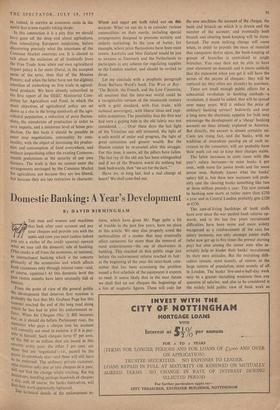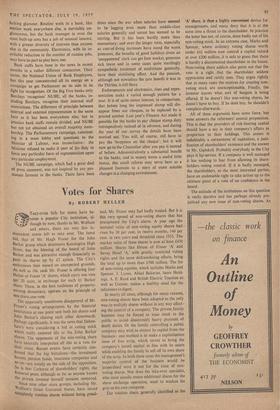Domestic Banking: A Year's Development
By DAVID BIRMINGHAM
From the point of view of the general public the development that deserves first mention is probably the fact that Mr. Graham Page has this summer reached the end of the long road along Which he has had to pilot his endorsement re- form. When his Cheques (No. 2) Bill becomes law, as it should do before Parliament rises, the Customer who pays a cheque into his account will normally not need to endorse it if it is pay- able to himself. Such cheques form 97 per cent. of the 500 or so million that are issued in this country every year; the other 3 per cent. are those that are 'negotiated'—i.e., passed by the to to somebody else—and these will still have to be endorsed. The ordinary private customer, who receives only one or two cheques in a year, _will not find the change wildly exciting. But big businesses, handling perhaps hundreds of cheques a day, and, of course, the banks themselves, will find their work appreciably lightened. ate technical details of the endorsement re- form, which have given Mr. Page quite a bit of trouble in the past few years, have no place in this article. We may also properly avoid the technicalities of a matter that may eventually affect customers far more than the removal of most endorsements—the use of electronics in banking. This reached its first public stage just before the endorsement reform reached its last: at the beginning of the year the inter-bank com- mittee that has been examining the problem issued a first schedule of the equipment it expects to need. It seems likely that in the near future we shall find on our cheques the beginnings of a line of magnetic figures. These will code for the new machines the amount of the cheque, the bank and branch on which it is drawn and the number of the account; and eventually both branch and clearing book-keeping will be trans- formed. The most striking change will come when, in order to provide the mass of material that computers thrive upon, the book-keeping of groups of branches is centralised in single branches. You may then not be able to have your statement on demand, and it seems unlikely that the statement when you get it will have the names of the payees of cheques : they will be replaced (as they often are already) by numbers.
These are small enough public effects for a substantial revolution in banking methods—a revolution, it should be added, that will be spread over many years. Will it reduce the price of ordinary banking service? Indirectly and over a long term the electronic appetite for bulk may encourage the development of a 'cheap' banking account on lines already explored in America. But directly, the answer is almost certainly no. Costs are rising fast, and the banks, with no tradition of immediate passing on of such in- creases to the consumer, will yet probably have their work cut out to keep their charges stable.
The latest increases in costs came with this year's salary increases—in most banks 6 per cent., with more for junior levels and for some senior men. Nobody knows what the banks' salary bill is, but these new increases will prob- ably cost the clearing banks something like two or three million pounds a year. The new entrant to banking now starts at rather more than £250 a year and in Central London probably gets £320 or £330.
The cost-of-living hardships of bank staffs have ever since the war pushed bank salaries up- wards, and in the last few years recruitment difficulties have been more and more widely recognised as a reinforcement of the case for salary increases, not only amongst junior staffs (who now get up to five times the prewar starting pay) but also among the senior men who in- evitably help or hinder their banks' recruitment by their own attitudes. But the recruiting diffi- culties remain, most acutely, of course, in the large centres of population, most acutely of all in London. The banks' five-and-a-half-day week may be a greater recruiting weakness than any question of salaries; and also to be considered is the widely held public view of bank work as lacking glamour. Routine work in a bank, like routine work everywhere else, is inevitably un- glamorous, but the bank manager in even the most built-up area has a job of unusual interest, With a greater diversity of interests than anyone else in the community. Electronics, with its in- evitable reduction in the number of routine jobs, may have its part to play here, too.
Bank staffs have been in the news in recent months in a rather different connection. Their union, the National Union of Bank Employees, has this year concentrated: all its energy on a campaign to get Parliament on its side in its ,fight for recognition. Of the Big Five banks only Barclays 'recognises' NUBE; all the banks, in- cluding Barclays, recognise their internal staff associations. The difference of principle between internal and external representation is the same here as it has been everywhere else; but in Practice bank staffs remain divided, and NUBE has not yet obtained an overall majority mem- bership. The Parliamentary campaign, culminat- ing in a mass lobby and questions to the Minister of Labour, was inconclusive: the Minister refused to make it part of his duty to force any particular form of representation upon any particular employment.
The NUBE campaign, which had a great deal of press comment, was not inspired by any pas- sionate ferment in the banks. There have been times since the war when salaries have seemed to be lagging even more than middle-class salaries generally and unrest has seemed to be stirring. But it has been hardly more than momentary; and over the longer term, especially as cost-of-living increases have eased the worst pressures, the benefits of good holidays (even an 'unappointed' clerk can get four weeks), generous sick leave and in some cases quite startlingly sympathetic treatment of misfortune generally, have their stabilising effect. And the pension, although not nowadays the rare benefit it was in the Thirties, is still there.
Endorsements and electronics, rises and repre- sentation make a varied enough pattern for a year. It is of quite minor interest, in comparison, that before long the impressed stamp will dis- appear from our cheques, to be replaced by a printed symbol. Last year's Finance Act made it possible for the banks to pay cheque stamp duty retrospectively instead of in advance, and during the year of our survey the details have been worked out. You will, of course, still have to pay the 'twopence on the cheque'; but it will now go to the Chancellor after you pay it instead of before. Administratively a substantial benefit to the banks, and in money terms a useful little bonus, this small reform may serve here as a pleasant footnote to a story of more notable changes in a changing environment.















































 Previous page
Previous page